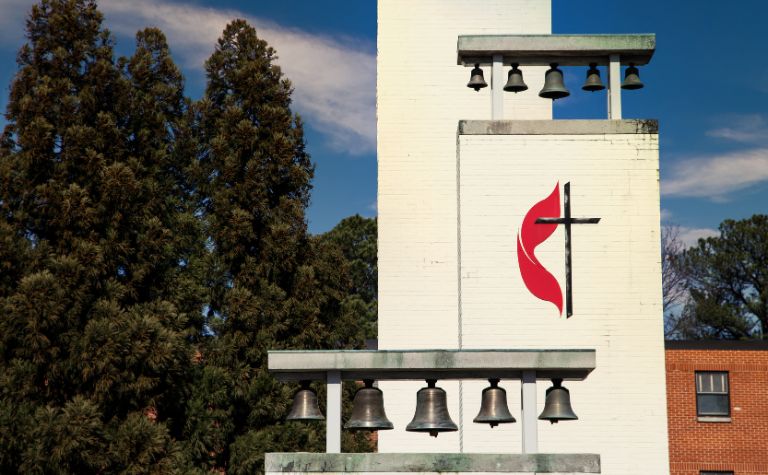Methodism and Lutheranism are two of the most influential Protestant Christian denominations. Many of their core beliefs are the same, yet they also have critical theological differences.
Methodism is about 200 years younger than Lutheranism. Methodism is Arminian, and Lutheranism isn’t. Methodists believe the Lord’s Supper is the real presence of Christ, and Lutherans hold to consubstantiation. The traditions agree about the Trinity, the deity of Jesus Christ, and the inspiration of Scripture.
How do Methodism and Lutheranism’s founders, denominations, and social worldviews compare? How do their beliefs about God, Scripture, and spiritual gifts compare? Keep reading to learn more.
Also see Largest Christian Denominations: Top 100 for more.

Methodism and Lutheranism Comparison
Methodism and Lutheranism are branches of Protestant Christianity, yet they originated in different centuries and countries and challenged other authority structures. (Also see Methodist vs. Anglican: What’s the Difference?)
Luther challenged the Catholic church. Wesley challenged the Church of England. The roots of these denominations come from the convictions of their founders, yet some present-day churches in these traditions are changing.
| Methodism | Lutheranism | |
|---|---|---|
| Founder | John Wesley (1703-1791) | Martin Luther (1483-1546) |
| Origin | 18th-century England | 16th-century Germany |
| Early influencer(s) | Other than John Wesley, Charles Wesley (1707-1788) and George Whitefield (1714-1770) played key roles in the denomination’s formation | Other than Martin Luther, Philip Melanchthon (1497-1560) |
| Significant writing outside the Bible | The Apostles’ Creed, The Nicene Creed; Wesley edited the 39 Articles of Religion, removing the Calvinist teachings in it; he also edited the Book of Common Prayer after the Revolutionary War; the United Methodist Hymnal | The Apostles’ Creed, The Nicene Creed; Luther’s shorter and large catechism, the Book on Concord, the Augsburg Confession |
| Organization | The term “connectionalism” describes the network of relationships among Methodist churches. “Bishops” lead churches within the framework of the Episcopalian polity. | Churches exist in “synods,” i.e., conferences or districts; some denominations have bishops, some don’t; congregations typically vote on pastors |
| Divisions | There are many denominations in the Methodist tradition. The United Methodist Church (UMC) is the largest. The African Methodist Episcopal Church (AMEC) is the second largest. | There are many denominations in the Lutheran tradition. The Evangelical Lutheran Church of America (ELCA) is the largest. The Lutheran Church-Missouri Synod (LCMS) is the second largest. |
| Theological and Social worldview | It depends on the denomination. Many churches in the UMC denomination have adopted liberal perspectives on social and theological issues in recent decades. Other smaller denominations, such as the Evangelical Methodist Church (EMC), maintain conservative positions. | It depends on the denomination. The LCMS is conservative; the ELCA is moderate to liberal, depending on the congregation. |
Also see What Do Methodists Believe? to learn more.

Methodist and Lutheran Beliefs: Similarities and Differences
Methodism and Lutheranism find common ground on several core teachings, including the Trinity, the deity of Christ and the Holy Spirit, the inspiration of Scripture, and the Second Coming of Christ.
They are also united in rejecting specific Catholic teaching like transubstantiation, i.e., the bread and cup at communion becomes the body and blood of Christ and the papacy.
| BELIEFS | Methodism | Lutheranism |
|---|---|---|
| Theology (general) | Lutherans are Protestant. They believe that salvation is by grace through faith in Christ and not according to works. | Lutherans are Protestant. They believe that salvation is by grace through faith in Christ, and not according to works. |
| Theology (specific) | The Bible is inspired according to traditional Methodist teaching. Some conservative Methodist denominations in America accept and use the term “inerrancy,” which means that Scripture is without error. | “Lutheranism” isn’t just the name of the tradition of Luther, but also the theological system within it. |
| God | Methodists believe in the Trinity. There is one God who exists in three persons. | Lutherans believe in the Trinity. There is one God who exists in three persons. |
| Is Jesus God? | Yes | Yes |
| Is the Holy Spirit God? | Yes | Yes |
| The Bible | Conservative synods affirm Scripture’s authority, inspiration, and inerrancy; moderate-liberal synods view the Bible as a helpful guide to belief and practice but an imperfect one at best. | Conservative synods affirm the authority, inspiration, and inerrancy of Scripture; moderate-liberal synods view the Bible as a helpful guide to belief and practice, but an imperfect one at best. |
| View of the atonement | Neither Calvinist nor Arminian, but “Lutheran”; conservatives believe in election but don’t define it like Calvinists. | Conservative synods affirm the truth of the gospel and believe that Christ took the place of sinners and paid their penalty on the cross; moderate-liberal synods see the death of Christ as an example of dying for something you believe in. |
| Salvation | Methodists are Arminian, as opposed to Calvinists or Reformed. | Some Methodists are cessationists; others are continuationists.* Pentecostal expressions have been associated with revivalism in the Methodist tradition, which has historically been a topic of internal debate and tension. |
| Spiritual gifts | Methodists believe in the real presence of Christ, making it more than a memorial like in some Protestant traditions, but they don’t believe in transubstantiation as Catholicism teaches. | Most Lutheran synods and churches are cessationist, meaning they don’t practice charismatic and Pentecostal expressions of Christianity.* Some small movements like Lutheran Renewal advocate for continuationism. |
| Baptism | Pastors baptize infants as a sign of regeneration. Adult converts can be baptized, often by sprinkling. | Pastors baptize infants who receive the gift of regeneration of the Holy Spirit; faith is necessary for grace to be conveyed (unlike Catholicism). Adult converts can be baptized, often by sprinkling. |
| Communion | The real body and blood of Christ are believed to be “in, with, and under” the bread and cup; this view is often called “consubstantiation.” | The actual body and blood of Christ are believed to be “in, with, and under” the bread and cup; this view is often called “consubstantiation.” |
| Eschatology | The Second Coming of Christ is a primary doctrine; the millennium is understood according to Amillennial theology, meaning it interprets the 1,000-year period described in Revelation 20:1-6 figuratively and defines it as the time between Christ’s first and second coming (i.e., the Church Age). | The Second Coming of Christ is a primary doctrine; Lutheranism is Amillennial. |
Also see Christian Denominations Compared to learn more.

* Continuationism and cessationism: Continuationism is the belief that all spiritual gifts, even speaking in tongues and the gift of healing, “continue” today and are operational in the Church.
Cessationism is the belief that some spiritual gifts have “ceased” because God only intended their use for the establishment of the Church in the first century. (Also see Do Methodists Speak In Tongues?)
Please see the related articles below.
References:
[1] Source
[2] Source
[3] Source
[4] Source
Related Articles
Roman Catholic vs. Protestant Christianity: What's the Difference?
Roman Catholicism, Protestant Christianity, and Eastern Orthodoxy make up the three historical branches of the Christian religion. Catholicism and Protestantism are, by far, the two largest branches....
Pentecostalism vs. Charismatic Movement: What's the Difference?
Many people know that the terms "Pentecostal" and "charismatic" are associated with certain beliefs, churches, and people in modern Christianity but aren't sure how they compare. Although the terms...
